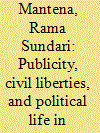|
|
|
Sort Order |
|
|
|
Items / Page
|
|
|
|
|
|
|
| Srl | Item |
| 1 |
ID:
135798


|
|
|
|
|
| Summary/Abstract |
This article revisits the early twentieth century to rethink the forces that shaped discourses surrounding political community—specifically the political community in its regional articulation. As we begin to look at the particular ways in which the discourse of rights and political representation have emerged at the regional level in post-independence India, we begin to get a sense of the unique social, cultural, and political dynamics that constitute the region distinct from the dynamics of nationalism and national identity. Specifically, I examine the dynamics of a new discourse of politics in twentieth-century south India, primarily in the Telugu-speaking districts of the Madras Presidency and the princely state of Hyderabad. With the institution of representational bodies/institutions at the regional level, the extension of the franchise and the rise of a public politics based on liberal ideas of public reason, and debate at the turn of the twentieth century, we witness the emergence of the region as the site of a distinct set of political dynamics.
|
|
|
|
|
|
|
|
|
|
|
|
|
|
|
|
| 2 |
ID:
166857


|
|
|
|
|
| Summary/Abstract |
In the 1930s, there were two glaring questions confronting the princely state of Hyderabad's Administration: the question of sovereignty (or the political future of the Hyderabad) and the problem of civil liberties. This article explores the complex socio-political conditions in the early decades of the twentieth century that gave rise to the formation of dynamic civil-society institutions in the princely state of Hyderabad. In particular, it asks how and why the discourse of civil liberties was taken up by these institutions and assesses the response of the Hyderabad Administration with respect to safeguarding civil liberties for its subjects. What the historical record reveals is that the early decades of the twentieth century in Hyderabad became a battleground between the Hyderabad Administration and the burgeoning public sphere that the Administration could not control nor manage.
|
|
|
|
|
|
|
|
|
|
|
|
|
|
|
|
| 3 |
ID:
126142


|
|
|
|
|
| Publication |
2013.
|
| Summary/Abstract |
The late-nineteenth century in India, usually scrutinized for the emergence of anti-colonial nationalist thought and politics, witnessed broader, and potentially more radical changes in the making and re-making of political subjectivities as articulated within burgeoning vernacular public spheres. Vernacular publics coalesced around the emergence of new communicative forms, the formation of voluntary and political associations, and the restructuring of literary communities. It is within this context I place the writings of Gidugu Venkata Ramamurti (1863-1940). He proclaimed at the turn of the twentieth century that Telugu as a language had to be reformed in order for it to become an appropriate medium for the newly emergent Telugu public spheres. Through his study of linguistics, his commitment to educational reform, and his study of Telugu language and literature, Ramamurti became the spokesperson for a new Telugu that would be able to traverse the boundaries of modern genres of writing that flourished in the colonial era. Fully immersed in linguistic theories of the day, Ramamurti's concerns were primarily with language reform and its centrality in the remaking of political subjectivities.
'In this era there is an important challenge facing us. There is no Telugu word for 'challenge,' nevertheless, the word, 'dhikaaramu' or defiance, comes close. For that reason, I am calling this era, 'dhikaara yugamu,' the age of defiance. In the past, society was divided between free people and the enslaved. Soon, the enslaved defied the power of the free and freed themselves. In the past, women were not allowed to be educated nor were they allowed to work. Now they are asking themselves why they were not considered more productive in society? These days, women are performing all kinds of work. . . .Until recently, in most countries the wealthy held power. And now the poor are challenging the power of the rich'.
|
|
|
|
|
|
|
|
|
|
|
|
|
|
|
|
|
|
|
|
|